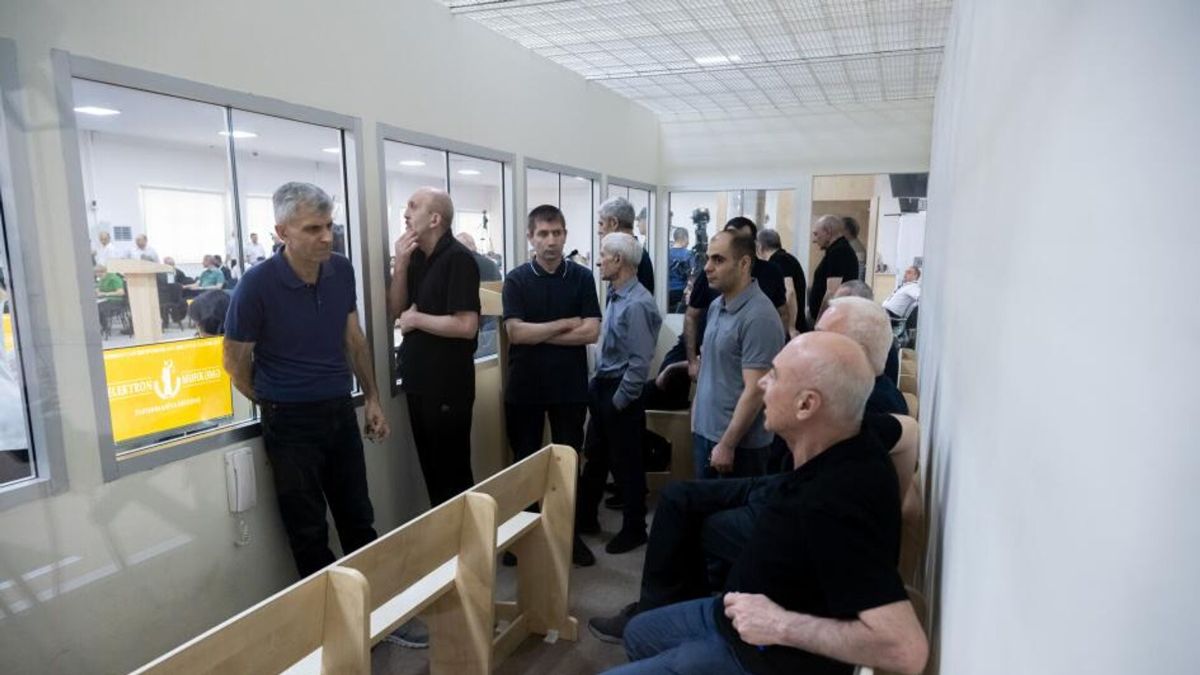'Hearings turned into sham': Ruben Vardanyan drops lawyer
Vardanyan rejects court lawyer
Prominent businessman and philanthropist Ruben Vardanyan, a former minister of the unrecognised Nagorno-Karabakh Republic, has rejected the state-appointed lawyer in his trial in Baku. Azerbaijani media reported that the court granted his request at the hearing on 21 October.
The following day, Vardanyan explained his decision through his family. He said: “This was a forced choice. Gross violations of international and Azerbaijani legal norms have turned the hearings into an outright sham. Over the past months, all procedural means of defence have been exhausted under these conditions.”
The Baku Military Court is hearing Vardanyan’s case, even though he never held a military position. Independent media and international observers are barred from attending the proceedings. He faces life imprisonment on the serious charges brought against him.
According to official data, Azerbaijan holds 23 Armenian prisoners of war, including former military and political leaders of the unrecognised Nagorno-Karabakh Republic. Their trial has been ongoing for eight months. Armenian human rights activists say the prisoners are being tried in Baku on false charges.
- ‘The last hope for Armenian prisoners is dying’: Red Cross office in Baku to close
- Armenian political analyst: ‘Aliyev sabotages peace process initiated by Trump’
- Thomas de Waal: Peace between Yerevan and Baku is possible, but not guaranteed
‘I don’t need the illusion of protection‘
Ruben Vardanyan published a statement on his Facebook page explaining why he rejected the state-appointed lawyer. He cited the lack of proper conditions for legal defence and repeated violations of legal norms.
In the statement, Vardanyan details why he chose to reject the lawyer:
“I was never given the opportunity to review the case materials and the indictment. Access to the case files remains closed. I cannot examine the 422 volumes of my case, and the court did not provide official translations of key procedural documents.”
He emphasises that the court denied him the ability to defend himself properly:
“I could not exchange documents with the lawyer without restrictions or prior review for trial preparation, and I had no access to audio and video materials. All my previous motions were ignored by the investigators and the court. Important requests from my lawyer, necessary for a fair trial, were also left unanswered.”
Vardanyan also explains that he refused the lawyer as a protest against the staged nature of the trial:
“Another reason I refused the lawyer, as a protest against this staged trial, was the court’s refusal to summon witnesses who could clarify the circumstances and confirm facts relevant to the defence. The court denied this motion, stripping the proceedings of any appearance of objectivity and fairness.”
He adds that the situation has worsened over time:
“In this theatre of the absurd, the role of a lawyer, regardless of their intentions and efforts, is reduced to maintaining the appearance of legal procedure. I refuse to participate in this farce. I do not need the illusion of protection — I demand real respect for my procedural rights.”
Human rights activists’ statement
In Baku, some Armenians imprisoned in Azerbaijan following the 44-day war in 2020 and the September 2023 military operation have already been sentenced. One of them, Vigen Euljekjian, was detained in Nagorno-Karabakh on 10 November 2020, after the active hostilities had ended. On 14 June 2021, the Baku Military Court sentenced him to 20 years in prison on charges of “mercenary activity” and “terrorism.”
A group of international human rights activists issued a statement, claiming that Vigen Euljekjian’s detention and conviction “are arbitrary and violate fundamental human rights.”
In addition, Maria Luciana Minasyan from Argentina and Aitor Martinez Jimenez from Spain filed a petition with the UN Working Group on Arbitrary Detention (UNWGAD). They called for the immediate release of Vigen Euljekjian.
The activists emphasise that Euljekjian, a 46-year-old tour guide who is Armenian and an Armenian citizen, cannot be legally charged with “mercenary activity.” Furthermore, they point out that military courts do not have jurisdiction over civilians. Nevertheless, the Baku Military Court convicted Euljekjian.
Armenian authorities’ efforts to secure prisoners’ release “not always visible or effective”
On 8 August in Washington, Armenian and Azerbaijani leaders reached key agreements with US mediation. Reports suggest the release of Armenian prisoners was also discussed, and a video circulated showing Donald Trump promising the Armenian prime minister he would ask President Aliyev to free 23 Armenians. So far, there has been little progress.
Armenian Prime Minister Nikol Pashinyan says efforts to secure the prisoners’ release are ongoing daily but cannot provide further details due to the “extreme sensitivity” of the issue. Foreign Minister Ararat Mirzoyan recently told journalists that the matter was also raised during a meeting with his Azerbaijani counterpart at the Sharm El-Sheikh “Peace Summit”:
“Work is ongoing every day, but it is not always visible or effective. I hope we will have good news soon. We hope our efforts will bear fruit in the near future.”
Despite this official optimism, human rights groups continue to report worrying conditions for the Armenian prisoners. They note that the Azerbaijani authorities’ closure of the International Committee of the Red Cross office has left the prisoners “completely isolated.”
Vardanyan rejects court lawyer



















